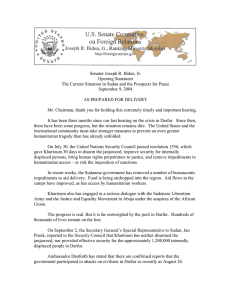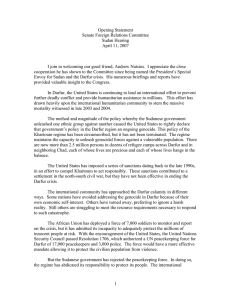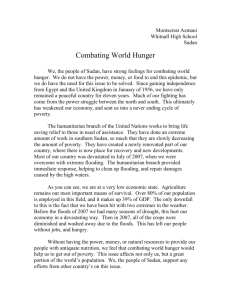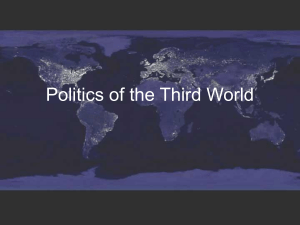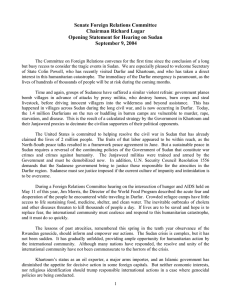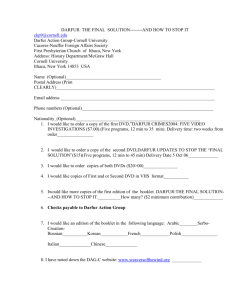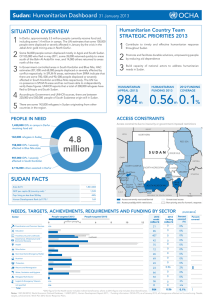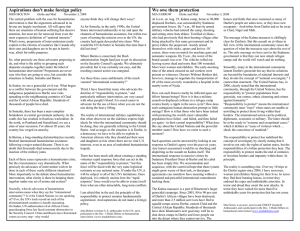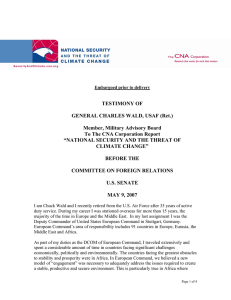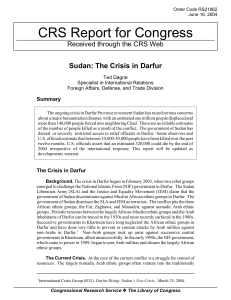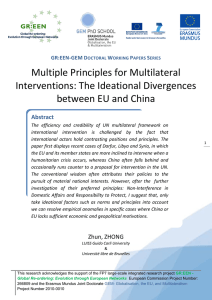Secretary of State for International Development, United Kingdom
advertisement
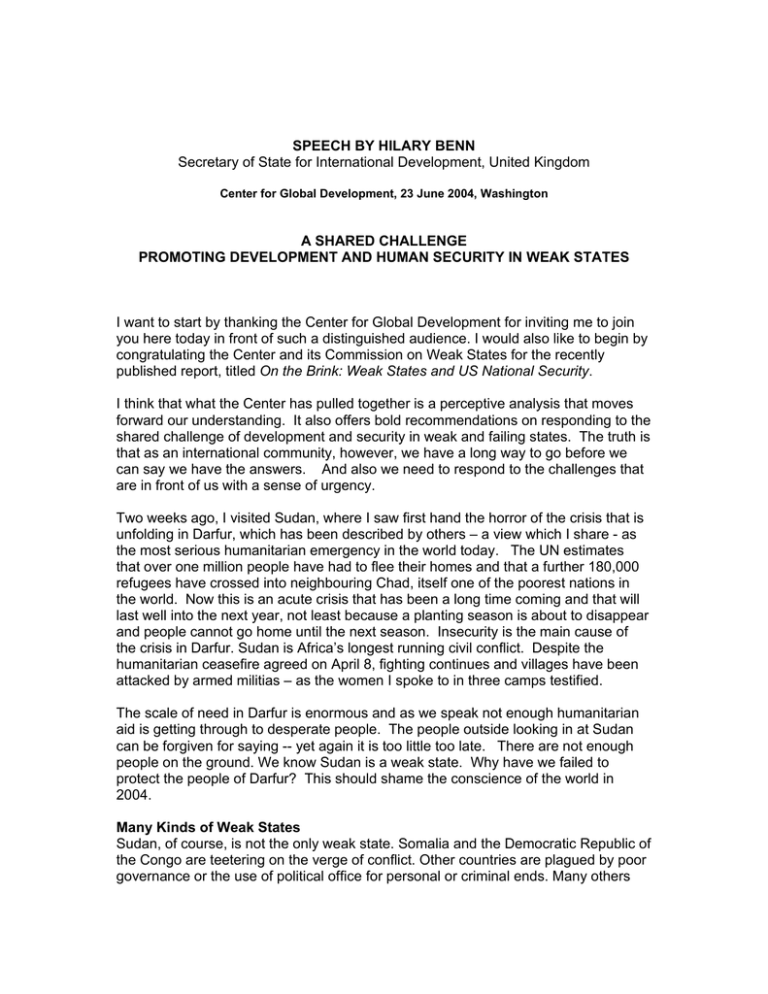
SPEECH BY HILARY BENN Secretary of State for International Development, United Kingdom Center for Global Development, 23 June 2004, Washington A SHARED CHALLENGE PROMOTING DEVELOPMENT AND HUMAN SECURITY IN WEAK STATES I want to start by thanking the Center for Global Development for inviting me to join you here today in front of such a distinguished audience. I would also like to begin by congratulating the Center and its Commission on Weak States for the recently published report, titled On the Brink: Weak States and US National Security. I think that what the Center has pulled together is a perceptive analysis that moves forward our understanding. It also offers bold recommendations on responding to the shared challenge of development and security in weak and failing states. The truth is that as an international community, however, we have a long way to go before we can say we have the answers. And also we need to respond to the challenges that are in front of us with a sense of urgency. Two weeks ago, I visited Sudan, where I saw first hand the horror of the crisis that is unfolding in Darfur, which has been described by others – a view which I share - as the most serious humanitarian emergency in the world today. The UN estimates that over one million people have had to flee their homes and that a further 180,000 refugees have crossed into neighbouring Chad, itself one of the poorest nations in the world. Now this is an acute crisis that has been a long time coming and that will last well into the next year, not least because a planting season is about to disappear and people cannot go home until the next season. Insecurity is the main cause of the crisis in Darfur. Sudan is Africa’s longest running civil conflict. Despite the humanitarian ceasefire agreed on April 8, fighting continues and villages have been attacked by armed militias – as the women I spoke to in three camps testified. The scale of need in Darfur is enormous and as we speak not enough humanitarian aid is getting through to desperate people. The people outside looking in at Sudan can be forgiven for saying -- yet again it is too little too late. There are not enough people on the ground. We know Sudan is a weak state. Why have we failed to protect the people of Darfur? This should shame the conscience of the world in 2004. Many Kinds of Weak States Sudan, of course, is not the only weak state. Somalia and the Democratic Republic of the Congo are teetering on the verge of conflict. Other countries are plagued by poor governance or the use of political office for personal or criminal ends. Many others have very fragile institutions. All of these struggle to manage social tensions or challenges to central authority. Other countries may be effective in providing some services to poor people, but suffer from repressive or isolationist regimes that block human development. These countries are today sowing the seeds for failure tomorrow. And, as Haiti has recently demonstrated, countries can move in and out of crisis very rapidly. A year ago Haiti was not really on the world’s radar screen of concern. Today we can see all too clearly its weakness. Conversely, Rwanda and Mozambique show how countries can move out of crisis to provide basic security and begin to raise the living standards of the poorest people. Weak States and Poverty There are different symptoms and causes of weak states. Yet they pose, it seems to me, a shared challenge to us.. Poverty is both a cause and an effect of human insecurity in developing countries. And it matters to people living here in the US and in the UK. It matters to the international community. It matters for the achievement of the Millennium Development Goals. And I say that because poor people are frontline victims in states that are unable or unwilling to carry out their basic functions. At their worst, collapsed states rob people of their lives. And the last decade has witnessed appalling conflicts around the world, including much of Africa. During the 1990s over 6 million people died and about 20 million people were displaced due to the impact of conflict. In the DRC, no one really knows how many people have died in the recent conflict. It might be 3 million or 3.5 million. It is often referred to as Africa’s hidden first world war because no one paid attention. Weak states represent the biggest test we have in fulfilling our promise to achieve the Millennium Development Goals by 2015. According to the World Bank’s Country Policy and Institutional Assessment indicators, the lowest-ranked 46 countries contain a huge share of people living in absolute poverty. These same countries contain 343 million people living on less than a dollar a day. That is more than the combined population in the United States and Canada. Paint a picture in your mind and imagine the wasted human potential. Imagine trying to pull the US and Canada out of absolute poverty without effective states to maintain law and order, promote growth and deliver services. These countries account for only 14% of the global population. Yet they contain 41% of all child mortality in the world. They account for a third of maternal deaths in the world. A third of people without access to safe drinking water. A third of children who don’t go to primary school. These figures are truly staggering. One of the main reasons why we are not on track to meet the Millennium Development Goals is the concentration of the poorest in weak states. Now the Goals are not actually about statistics. They are a means to an end. A better life for people. And let us be clear: people will not have a better life as long as they live in weak, broken-down or collapsed states. Without an effective government, development aid is likely to be wasted. Without legitimate and responsible states, we are unlikely to be able to curb terrorism. These are enormous obstacles, which we need to face-up to together. Weak States and Global Security Now weak states threaten global prospects for security and development. Let me highlight four ways in which these states affect all of us and affect the international community. First, states that are unstable often contribute to conflict in neighbouring countries. The spill-over effect of conflict in West Africa and the African Great Lakes Region is well-known to all of us. Instability and criminality have spread in the Balkans and the South Caucasus. Years of instability in Afghanistan have had a negative impact on its neighbours. Secondly weak states present a challenge to our system of global governance. For the international system to work, it depends on strong states. States that are able to deliver services to their populations, to represent their citizens, to control activities on their territory, and to uphold international norms, treaties, and agreements. Effective global responses to climate change, for example, will not be possible unless all governments can play their part. Thirdly, weak states pose serious threats to health worldwide. States that are unable or unwilling to sustain strong public health systems can become reservoirs of communicable diseases -- HIV/AIDS, polio and malaria. We estimate that 44% of people with HIV/AIDS in developing countries live in weak states. An outbreak of SARS, for instance, in a country with poor security and weak institutions could lead to a global epidemic. Finally, weak and failing states provide a breeding ground for international crime. This is rightly receiving a lot of attention as organised theft and violence, illegal trafficking of women and children, and drug networks flourish where institutions are weak and human security is vulnerable. If we do not do something to promote more effective states, we have no hope of advancing development and human security. No real hope of halting absolute poverty. No real hope of reducing child mortality. No real hope of stopping the scourge of terrorism. The question is: what can we do? As the Center for Global Development report points out, the international community is responding to the shared challenge on some fronts. But there is much room for improvement and we need to act now, not least because the task we face is enormous. The challenge for you, for me, for everyone working on these important issues, is to come up with better ways of responding to weak states. From where I sit, there are two ways in which we need to change. First we need to build on the linkages between security, diplomacy and development assistance in responding to weak states. Second we need better international cooperation. Integrating Security, Diplomacy & Development Apart from the imperative of the Millennium Development Goals, development also makes a critical contribution to global security by reducing poverty, inequality and the root causes of conflict. There will, as we know, be times when military force is the only way to protect human life. The UK operations in Sierra Leone or the French operations in the Ivory Coast are just two examples. But we also need to be better at protecting human security in other ways. Support to effective and accountable policing for instance is a very important part of development. So is policing that actually protects human rights. At the global level, development and security also link together. Global prosperity, everyone’s prosperity, depends on security against threats to human development. Threats such as injustice and HIV/AIDS. Threats such as environmental degradation, population movements, and transnational terrorism. The truth is, development without security is not possible; security without development is only temporary. That is why we are working in DFID to develop a new strategy paper on the connections between security and development. Because an effective response to both requires a shared analysis. But this is not enough. Shared analysis needs to result in improved decision-making. This in part means getting better at predicting when states are heading for crisis so we decide whether and how to act. Ultimately it is about policies working together for a common objective, rather than in isolation or, worse still, against one another. In other words, we need to make policy cohere more effectively. In the UK, we are putting policy coherence into practice by working in ways that are new to us. At one level we are trying to make sure we don’t send conflicting signals to weak states. These governments already have enough challenges to deal with, without lots of donor missions making contradictory demands. At another, and more important level, we are trying to become better partners for stability. In other words, to support states in a more effective and coherent way. I just want to highlight a couple of examples of these new ways of trying to do things. First, the Prime Minister’s Strategy Unit is working with UK government departments to develop a better way of identifying countries at risk of instability. We hope this will help to prioritise how the UK should respond; where it should spend its money; and how it can help reduce the risks. The Unit is involving all of the parts of government, though the significant players are the foreign, military and development departments. Second, three years ago, those same three government departments set up a Conflict Prevention Pool, which, as its name suggests, combines expertise, decisionmaking and, most importantly, budgets for conflict prevention programmes and peacekeeping. There are in fact two pools. One for sub-Saharan Africa and one for the rest of the world. I must say what an impact they have had. If you put the money together in one place, it promotes discussion among ministers of how to use it. A recent example is the support for the African Union ceasefire monitors in Darfur, who should be arriving as we speak. To take another example, in Georgia, the Pool supported diverse activities including community-based reconciliation, the appointment of a high-level Special Representative, and the work of a senior UK military adviser. These initiatives and others sponsored by the international community contributed to the climate in which a peaceful transfer of power in the country took place. An integrated UK framework doesn’t mean we will always be able to intervene. Of course we won’t. Sometimes others will need to take the lead. International Responses to Weak States If you take away a single message today, let it be this: we have to work together. Weak states pose an international threat. They demand an international response. The International Commission on Intervention and State Sovereignty highlighted in its report The Responsibility to Protect, that the international community has a duty not only to react to humanitarian crises, but also to help prevent states from descending into crisis. Countries at risk of instability are often made vulnerable by events beyond their own borders. Conflict spills over from neighbours. Trade patterns and preferences change. External economic shocks can destabilise the best development efforts. One of the things we need to recognise is that some people do rather well out of weak states. International money laundering networks enable corrupt leaders to hide the money they have corruptly gained. Warlords can rely on international markets to supply cheap weapons and affordable mercenaries. We need international action to choke off the incentives and interests: to try to make weak states less profitable for unscrupulous individuals. The international community can take preventive action on many fronts. We can work together to shut down the offshore tax havens and secret bank accounts. We can work to ensure that the income from oil, diamonds, timber, and other resources – some of which have fuelled conflict around the world -- is transparent and used responsibly. That is why the UK launched and supports the Extractive Industries Transparency Initiative. We can work together to limit access to the instruments of death. Small arms cause untold misery to the lives of poor people. Small arms and light weapons were the only type of weapons used in 46 out of the 49 conflicts that have broken out since 1990. That is why the UK Government is working along with others to combat small arms proliferation. The so-called Transfer Controls Initiative is calling on all UN Member States to make a commitment to stop the export of small arms to countries where they will fuel conflict, repress human rights or undermine development. I very much hope the US Government will support this UK initiative. Tackling global causes of crisis will be a very big task. But it is vital. And yet it will not be enough. We also need to ensure that the international community responds to the needs of poor people living in weak states. The first lesson here is to stay involved. Donors – and I criticise us as well as others -- have been too quick to pull out when things go wrong. But as Afghanistan or the Democratic Republic of the Congo have shown, walking away can carry a very heavy long-term and high price. Along with the international community, we need to shed the culture of short-term responsibility and build a culture of long-term relationships. This is essential if we are to avoid weak states from falling prey to destruction, disease and destitution. Second, as donors, we need to coordinate better. Too often we still run our own projects that add to the burden of weak and over-stretched governments. Donors need to set aside their short-term differences and come together around a more coherent way. In countries with a Poverty Reduction Strategy we are getting better at supporting nationally owned objectives rather than imposing our own projects. But weak states pose a bigger challenge. There is often no Poverty Reduction Strategy around which to coalesce. If there is, the government may be unable or unwilling to implement it. Contested territory and civil conflict make the challenges even greater. Now despite all of this, governments in the US and the UK need to work together and more closely with multilateral institutions to co-ordinate our support. It is not enough to work together today to get humanitarian assistance on the ground if we don’t work together tomorrow to get long term development. Third, we need to allocate resources better. This means more predictable funding and better needs assessment. Recent research at the World Bank has shown that aid to weak states is nearly twice as volatile as aid to low income countries generally. And they are the countries that are most likely to suffer from unpredictable aid. There is also a danger that our ambition to channel aid to good performers – if I can use the development jargon -- may leave weaker states unsupported. Aid allocation to post-conflict countries is particularly important. We tend to front-load our aid when post-conflict countries are least able to absorb it and reduce it when they are finally in a position to use it. There is evidence that post-conflict countries have a 40% chance of falling back into conflict within the first 5 years of transition. Fourth, now is the time to strengthen regional institutions to prevent and respond to state crisis. The Economic Community of West Africa has played a sterling role in guaranteeing security in Liberia. It was their initiative that brought the conflict to an end. And the African Union deployed peacekeeping forces to Burundi and peacekeeping observers to Darfur. I welcome the African Union Peace and Security Protocol. It is the most important development on the continent to build capacity for peacekeeping. The European Union has developed an African Peacekeeping Facility to support these initiatives. There is now a proposal for the European Union to develop a Peace and Security Instrument to target development assistance more effectively on security threats. The G8 is supporting regional strengthening in Africa through its partnership with NEPAD, and this will be taken forward when the UK holds the G8 Presidency in 2005. Regional partnerships underscore the important role of more stable developing countries, including Middle Income Countries. Addressing weak states is a challenge for all stable states, and we need to ensure that we are working collectively in a wide partnership. It would be a great mistake to think that the OECD countries can tackle these challenges alone. Fifth, and finally, we need to ensure our global organisations have the right capability to address the challenge of weak states. The deliberations of the UN High Level Panel are so important. And when Kofi Annan addressed the UN last September to launch the High Level Panel, in essence he gave a very clear and stark message. He said, look, if you don’t want states to act unilaterally, then the UN has got to be more effective in doing the tasks set out under the Charter. This really is the challenge. If you are the person in a weak state on the receiving end of conflict – in Afghanistan for instance – you could look at the UN Charter and say these are fine words, but when will they apply to me? When the United Nations was founded at the end of the Second World War, we jointly agreed global rules and standards by which states and individuals would be judged. If the UN Charter is to continue to mean anything to those it is meant to protect then we have to face up to the issue of weak and failing states. The development community, the security community, and the diplomatic community – if I may use these terms – all of us have a duty to engage in this debate. We cannot stand aside, any more than we could ever again allow 800,000 to be hacked to death in the space of 100 days – as happened in Rwanda ten years ago – and do nothing; absolutely nothing about what happened. This is not a return to the “national interest” of developed countries. I know this is a topic of enormous controversy in the development community. It is not a dilution of the development mission, but rather its evolution. It is not a dismantling of the international architecture of states, but rather a push to reinforce it. Because development cannot be just about raising incomes. It is about human security and opportunity. We are not just about upholding states’ rights but we are also about upholding their obligations to protect human life. In today’s interdependent world – this small and fragile planet -- our self-interest and our mutual interests are inextricably woven together. Our personal security depends on global security. We cannot achieve one aim without achieving the other. This shared challenge, so visible in Darfur, is one I believe we can no longer afford to ignore. Thank you.

